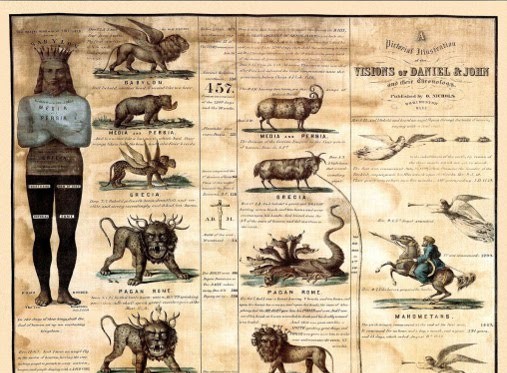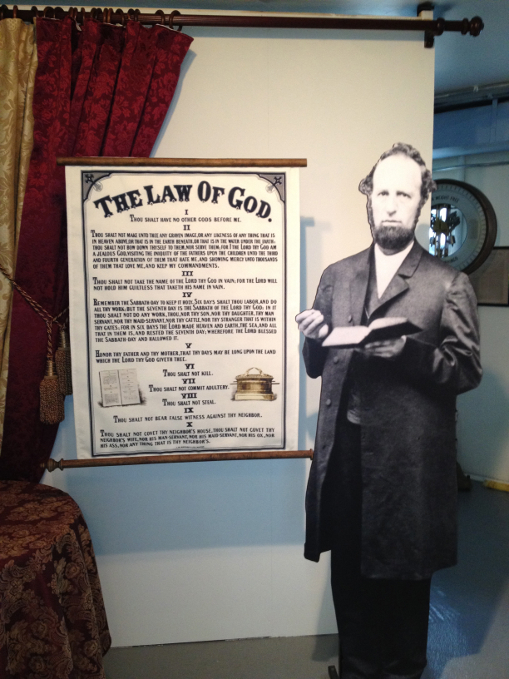I received a text this morning from my fellow blogger Nicole Stevenson. It reminded me that 168 years ago today (October 22, 1844) the forefathers and mothers of our shared Adventist heritage endured the shattering disappointment that ultimately birthed Seventh-day Adventism.
Nicole wrote, “One hundred sixty-eight years ago today God saw that long night knowing that He already (from eternity) had a plan and a purpose…He is so loving to have seen those faithless few and to have planned to rescue their seed from their faithlessness.”
We who have discovered the Lord Jesus to be our true Sabbath rest and have left everything we knew and loved in Adventism in order to be faithful to Him are the seed that He has rescued from that crushing night of shame and loss. We are the evidence of God’s faithfulness. No sin or deception is so great that God cannot redeem it in the lives of those who submit to Him.
As I thought about the facts of that pivotal event in Adventist history—an event that Adventism commemorates and includes in its own “meta-narrative”, it struck me that Adventists do not celebrate the investigative judgment they claim Jesus began in heaven on October 22, 1844, but they commemorate their disobedience to God’s word: date-setting. October 22 is remembered as the day of the Great Disappointment. Even as they acknowledge it, however, the name of the event camouflages the horror of disengaging from life in the expectation that Jesus would come back on a specific day.
Jesus said, “But concerning that day or that hour, no one knows, not even the angels in heaven, nor the Son, but only the Father. Be on guard, keep awake. For you do not know when the time will come. It is like a man going on a journey, when he leaves home and puts his servants in charge, each with his work, and commands the doorkeeper to stay awake. Therefore stay awake—for you do not know when the master of the house will come, in the evening, or at midnight, or when the rooster crows, or in the morning—lest he come suddenly and find you asleep. And what I say to you I say to all: Stay awake” (Mark 13:32-37).
The Millerites, however, believed Jesus would come on October 22. Many lost their crops and sold their household goods. They believed that they would be in heaven when the sun rose on October 23, and they let everything go.
Many of those disappointed Millerites repented and returned to their churches. There were a few, however, who refused to believe they could have been wrong. They persisted in trying to find a way to explain that October 22, 1844, was a valid date, and they came up with what the late Walter Martin termed “a poor face-saving technique” to explain its significance: the investigative judgment. Those few who refused to acknowledge their sin of date-setting embraced a further non-biblical invention, and their legacy became the Seventh-day Adventist organization.
The Great Disappointment, in reality, was not an event ordained by God to launch His last-day movement of truth. Rather, it was an event that launched an even more insidious deception: a legacy of confusion that includes a weak Jesus, a spirit-less humanity, an incomplete atonement, a created day as the “seal of God”, and a Satan who continues to battle with Jesus in an attempt to prove God is unfair. This confusion defines the Seventh-day Adventist worldview, and it publicly masquerades as Christianity.
The Jesus revealed in Scripture, however, is sovereign even over this legacy of confusion. Jesus is even now redeeming the deceptive legacy of the Great Disappointment in the lives of growing numbers of people who are trusting the completed atonement He accomplished by dying on the cross for human sin, by being buried, and by rising from the dead on the third day.
Jesus lives, and He has already sat down at the Father’s right hand—and we who believe are already seated with Him there (Eph. 2:4-7). We who trust His death and resurrection as atonement for all our sin—past, present, and future—have already passed out of death into life and do not come into judgment (Jn. 5:24). We do not know when Jesus will return, but the timing is a moot point. We are already eternally secure in Him, and nothing—not death nor life, angels nor principalities, things present nor things to come, not powers nor height, depth, nor any other created thing—nothing can ever “separate us from the love of God, which is in Christ Jesus our Lord” (Rom. 8:38-39).
The Adventists’ commemoration of the Great Disappointment unwittingly reveals the core of the Adventist deception: the movement itself was birthed in unbelief. No matter how sincere their pain and confusion, the refusal of those founding fathers and mothers of Adventism to take Scripture seriously has launched a legacy of spiritual confusion and unbelief.
Praise God our Father who sent the Son to become sin for us—to atone even for the sin of our unbelief and rationalization. Praise God the Son who “is the way, the truth, and the life” (Jn. 14:6), that we who believe in Him “will not walk in the darkness but will have the Light of life” (Jn. 8:12). Praise God the Holy Spirit who brings our spirits to life when we “have been born again not of seed which is perishable but imperishable, that is, through the living and enduring word of God” (1 Pet. 1:23).
Praise the triune God for redeeming the Great Disappointment in our lives, for drawing us to the Lord Jesus and for giving us the gift of faith and the foundation of His unerring word.
There is no disappointment in Jesus.
- A Shepherd is Home - July 17, 2025
- July 19–25, 2025 - July 17, 2025
- We Got Mail - July 17, 2025



Colleen,
You wrote:
“Rather, it was an event that launched an even more insidious deception: a legacy of confusion that includes a weak Jesus, a spirit-less humanity, an incomplete atonement, a created day as the “seal of God”, and a Satan who continues to battle with Jesus in an attempt to prove God is unfair.”
I agree totally.
Can I add another two more to this unholy “stew”:
# an inability to proclaim with joy Jesus’ cry from the cross: “It is finished!” as a cry of victory over satan* and all the gathered hosts of evil.
Here, on the cross, Jesus was saying: “I’ve won!” (for the grammarians – past perfect tense).
*(I choose not to capitalise here so as to deny satan recognition that since Jesus’ resurrection, he is now a spent force – fighting an increasingly desperate rearguard battle as Jesus’ Second and Glorious Coming draws ever nearer.)
# an inability to proclaim the death of death itself in the resurrection of Jesus from the dead.
This was the most ancient resurrection hymn in the Church, going back to the first century:
“Christ is risen from the dead, trampling down death by death! And on those in the tombs bestowing life!”
For those in Jesus Christ, death itself has no power over them. The Holy Apostle John in his second gospel (Revelation) said this (20:6):
“Blessed and holy are they who have part in the first resurrection (of Jesus from the dead). Over such the the second death (at the end of the world) has no power, . . .”
Bless you for these insights, and may you go from strength to strength in the power of Jesus’ resurrection from the dead.
JohnB